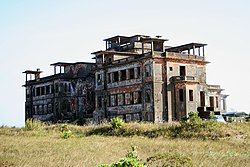Bokor Hill Station
|
Phnom Bokor កស្ថានីយភ្នំបូកគោ |
|
|---|---|
| Town | |

Bokor Palace Hotel in 2007
|
|
| Location of the Town of Phnom Bokor | |
| Coordinates: 10°37′49.47″N 104°1′2.16″E / 10.6304083°N 104.0172667°E | |
| Country |
|
| Province | Kampot |
| District | Kampot District |
| Built | 1921 |
| Elevation | 1,048 m (3,438 ft) |
| Population (2011) | |
| • Total | 4,000 |
Bokor Hill Station (in Khmer: កស្ថានីយភ្នំបូកគោ Kosthany Phnom Bokor) refers to a collection of French colonial buildings (hotel & casino, church, royal residence etc. ), constructed as a temperate mountain luxury resort and retreat for colonial residents in the early 1920s atop Bokor Mountain in Preah Monivong National Park, about 37 km (23 mi) west of Kampot in southern Cambodia. Abandoned for long periods of time, modern infrastructure has made the location easily accessible as re-development is taking place. It was used as the location for the final showdown of the movie City of Ghosts (2002) and the 2004 film R-Point. To the north-east are the Povokvil Waterfalls.
The Damrei Mountains (Tà Lơn in Vietnamese) have long been venerated as to be sacred by both, Khmer and Vietnamese people. A great number of Vietnamese mystics and ascetics such as Cử Đa, Ngô Văn Chiêu and Huỳnh Phú Sổ had lived in the area during the 19th and 20th centuries.
The hill station was built as a resort by colonial French settlers to offer an escape from the heat, humidity and general insalubrity of Phnom Penh. Nine hundred lives were lost in nine months during the construction of the resort in this remote mountain location.
The centrepiece of the resort was the grand Bokor Palace Hotel (which has never been a casino) inaugurated in 1925. It as been complemented by the villa of the "Résident Supérieur", a post office (now demolished), a catholic church. It is also an important cultural site, showing how the colonial settlers spent their free time.
Bokor Hill was abandoned first by the French in late 1940s, during the First Indochina War, because of local insurrections guided by the Khmer Issarak.
...
Wikipedia

